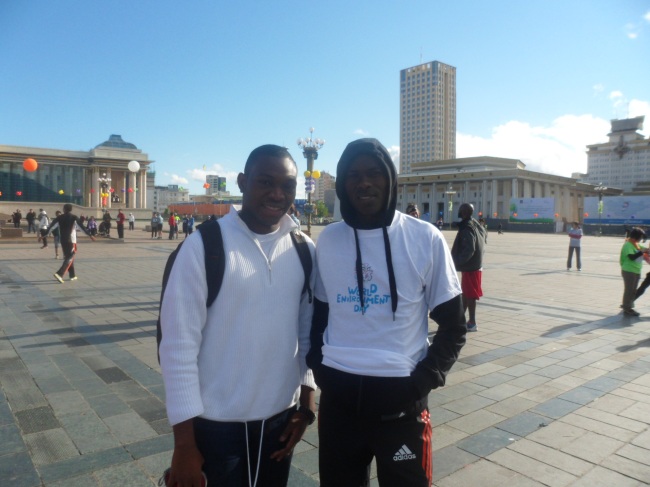The 4th annual Ulaanbaatar city international marathon was today flagged off by current marathon world record holder and UNEP Patron for Clean Air Patrick Makau. Makau is from Kenya and he holds the world record in the marathon with a time of 2:03:38, set at the 2011 Berlin Marathon. He was named the UNEP clean air patron on February 23rd 2013.
Over 400 registered runners participated in the 42km race and the runners made their way through the city on a day in which the city centre was also designated car free, all as part of events to mark World Environment Day.
The marathon was jointly organised by the Mongolian Olympic Committee, Mongolian Athletics Federation and Air Mongol Travel Group, one of leading tour operators of Mongolia. The aim of the event was to highlight the growing challenges Ulaanbaatar and Mongolia as a whole is facing in terms air pollution. Due to Ulaanbaatar’s rapid population growth, the number of vehicles in the city has doubled over the past decade. According to the World Health Organization (WHO), over half of Ulaanbaatar’s vehicles do not meet emissions standards, and 80 per cent of the fleet is over 10 years old. As a result of this, the Mongolian government is making concerted efforts to reduce air pollution as well as the serious damage to health and the environment that it causes.
Speaking to journalists at the event, Mr Makau called for collective effort to tackle air pollution worldwide. “I could not remain silent about the air pollution especially in the part of the world I am from, so I decided to do something. That is why I am here as a clean air ambassador for the UNEP”. The star athlete will remain in Mongolia this week to promote World Environment Day (5 June) – the UN’s biggest event for positive action on the environment, which is organized by the United Nations Environment Programme (UNEP).
“In the run-up to World Environment Day, it is important that we continue efforts to reduce air pollution, and the serious damage to health and the environment that it causes. Such actions can reduce disease levels and ensure we leave a healthy environment for future generations,” he added.
A recent study by the World Bank found that the level of soot-like pollutants – known as particulate matter – in the air in the Ger districts was up to 7 times higher than World Health Organization standards.
Efforts are being made to tackle the problem. The government has been promoting cleaner, more efficient cook stoves, while traffic restrictions have been introduced in Ulaanbaatar to cut emissions from vehicles and to help ease the city’s chronic congestion. Together with national governments, UN agencies, and other partners, UNEP, through the Climate and Clean Air Coalition (CCAC), has been spearheading international efforts to raise awareness of the major environmental and economic benefits of cutting emissions of soot, black carbon and other air pollutants. The CCAC is working with ten major cities including Rio de Janeiro, Lagos, Stockholm, Accra, and Tokyo, to reduce methane emissions from landfills, and black carbon or soot from burning waste.
World Environment Day celebrations will continue in Mongolia this week, and are set to include the launch of the country’s first wind farm, and activities focusing on the potential growth of the country’s eco-tourism industry.


